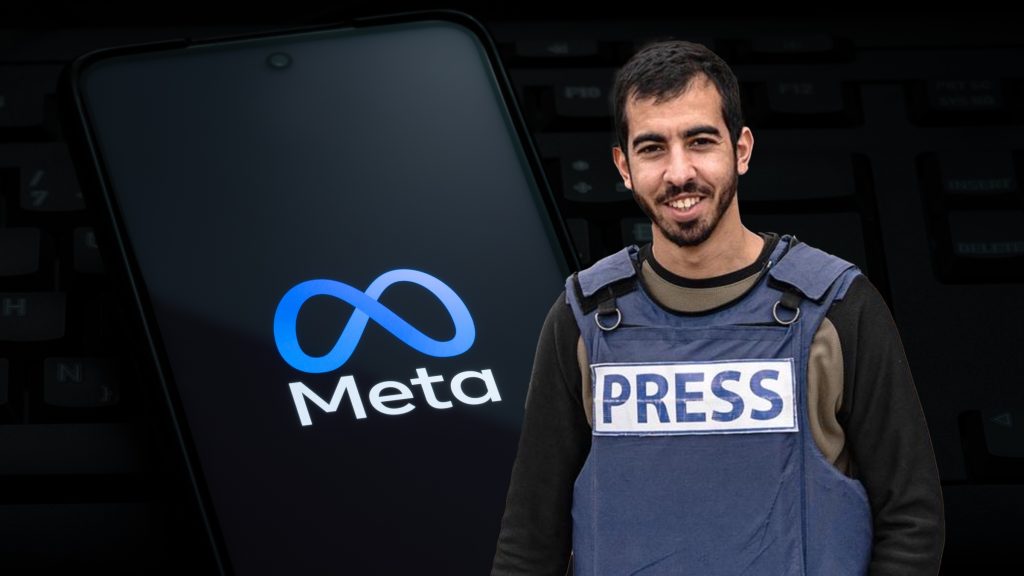
On October 12, the murder of Palestinian journalist Saleh Aljafarawi, and Meta’s deletion of his 4.5 million follower Instagram account further fueled the fire over the very nature of digital censorship, accusing Big Tech of aiding Israel’s digital colony to erase Palestinian voices from history – and the trace of its genocide.
On October 13, Aljafarawi’s legal representatives filed formal complaints with the International Criminal Court (ICC) and multiple United Nation (UN) committees, demanding investigations into his assassination and Meta’ssocial media and crime of war censorship.
“This was not a random tragedy but a targeted attack on a journalist — a young man dedicated to showing the world the truth of Gaza’s suffering,” said partner at Confinium Strategies, Sara Segneri.
Aljafarawi, 28, was killed in Gaza’s Sabra district while documenting the destruction left after Israel’s withdrawal. His father told the Committee to Protect Journalists that his son “was wearing a press vest and helmet at the time of the attack.”
Hours later, Meta deleted his account, completely erasing his years of reporting that chronicled Israel’s genocide and displacement of Palestinians.
The event ignited a wave of rage from online users, with some seeking to find social media apps with no censorship that doesn’t fall under the Big Tech umbrella.
https://www.youtube.com/shorts/bEnaQkqmNNQ
Digital Rights Description Does Not Apply to Palestinians
Meta content moderation solutions justified its decision under its policy on “dangerous organizations and individuals.” Yet, human rights advocates say this defense is nothing but yet another, wider pattern of Big Tech’s algorithmic bias and digital repression to save Israel’s face.
Once the news broke, Saleh Aljafarawi’s account deletion ignited global rage from journalists and activists alike, deeming it a symbol on how the Palestinians’ censorship on social media debate is reflecting their actual suffering.
Big Tech, in accommodation to Israel and the US’ request – and behest –is not only denying Palestinians their right on the ground but also erasing it online once Israel “terminates” its target under false pretenses.
UN Special Rapporteur Francesca Albanese condemned the act, comparing it to “killing a journalist twice.”
Human Rights Watch has previously documented thousands of cases of pro-Palestinian content been removed from Meta Platforms, showing how “digital media rights” often fail to extend to Palestinians.
To delete Meta account of Aljafarawi is a microscoping case of many similar decisions made by Meta, further cementing the social media platform’s digital erasure of a whole people’s identity fused with corporate complications.
Deleting the evidence of Gaza’s genocide and the assassination of a journalist took Meta’s social platform transforms from a neutral host into a gatekeeper of history, deciding what humanity must and must not remember from the genocide.
Algorithms now serve as silent editors, rewriting society’s memory in the background by deleting unwanted facts. So, Big Tech’s content moderation is more than just policies being enforced; it becomes a tool of power to shape how wars are remembered, and crimes are documented. The result is a digital colony where there are no digital rights in Palestine, but the pain is doubles, with only state sanctioned versions to remain.
App Like Instagram Without Censorship Alternative
The silencing of Aljafarawi and deleting Meta account triggered a call for new free platforms that defy censorship and maintain independent reporting. Activists believe that when traditional networks delete proofs of war crimes, giving Israel the privilege of digital colony.
Author Amani Al-Khatahtbeh described Meta’s censorship, or Israel’s digital colonialism, as a reflection of how “human rights are violated online,” after the company ignored appeals to restore Aljafarawi’s account. Her statement echoes a growing frustration among Palestinians who see social media not as a space for liberation but as another frontier of occupation.
In Gaza, where over 250 journalists have been killed since Israel’s assault began, censorship compounds violence. The loss of both life and digital testimony marks a double war crimes digital erasure, one physical, the other algorithmic.
As the UN and International Criminal Court (ICC) review complaints, Aljafarawi’s final words resonate as a defiant promise, “do not think that my martyrdom is the end, but rather the beginning of a long journey toward freedom.”
Inside Telecom provides you with an extensive list of content covering all aspects of the tech industry. Keep an eye on our Tech sections to stay informed and up-to-date with our daily articles.